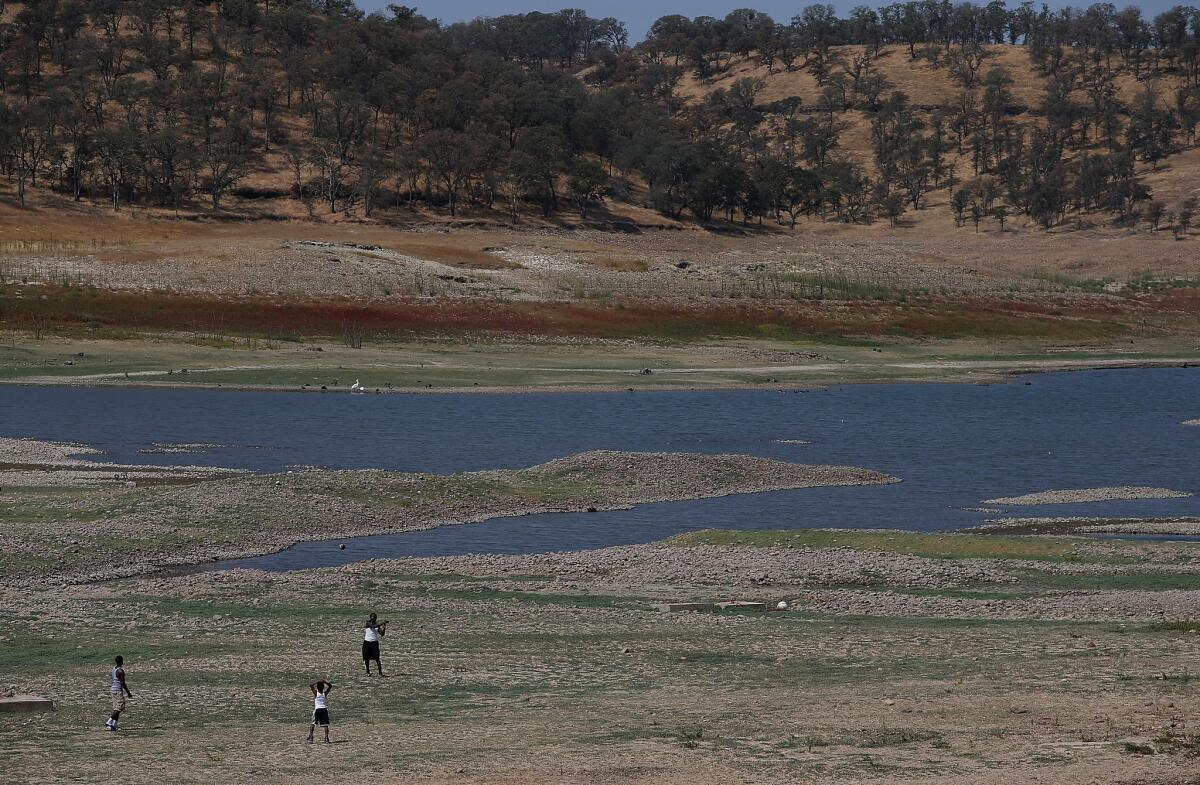California lawmakers considering historic shift in groundwater policy

Reporting from SACRAMENTO â As California continues to endure a calamitous lack of water from the sky, the state could, for the first time, start to regulate water drawn from the ground.
Groundwater regulation has been politically poisonous since the stateâs founding. But lawmakers and Gov. Jerry Brownâs administration are hoping to capitalize on the current parched conditions, and cautious cooperation from once-resistant interest groups, to pass a plan for a groundwater management system by the end of the month.
âThis falls under the category of: Never let a crisis go to waste,â said Assemblyman Roger Dickinson (D-Sacramento), an author of the legislation.
The drought has propelled water policy to the top of the Legislatureâs agenda in the final month of its session. Brown and lawmakers are also negotiating revisions to a water bond measure scheduled for the November ballot. Theyâre at odds over how much borrowing voters should be asked to approve to pay for such projects as storage and groundwater cleanup.
Meanwhile, the droughtâs effects have been buffered somewhat by groundwater reserves.
A study released last month by UC Davis found the stateâs economy has taken a $2.2-billion hit this year because of the drought â costs that would have been much higher except for increased pumping of groundwater. Researchers said increased reliance on underground reserves made up for as much as 75% of the water lost from surface sources.
There are no statewide rules on how much water can be taken from the ground. Since the Gold Rush days, groundwater has been considered a property right; landowners are entitled to whatâs beneath them.
As the availability of water from lakes and rivers has become more inconsistent because of drought or environmental regulation, groundwater extraction has increased. That has caused more water to be removed from some underground basins, especially in the agriculture-rich San Joaquin Valley, than is being replaced.
âWhat weâre doing with groundwater is an equivalent to deficit spending,â said Lester Snow, director of the nonprofit group California Water Foundation and a former state secretary for natural resources. âSomething bad is going to happenâ in the long run, he said.
Some water districts have started managing underground sources on their own; others have become regulated after long and costly court battles. But some key basins remain unregulated, and there are substantial gaps in information about the stateâs groundwater supply.
The Department of Water Resources estimates the stateâs wells number from 1 million to 2 million â a significant variance.
âThat shows you how out of whack the system is,â said Jay Ziegler, director of policy of the Nature Conservancy, an environmental group.
The legislative proposal contained in two identical bills would direct local agencies to create plans by 2020 for managing their groundwater. The plans could be customized to fit local needs, and the state could step in to enforce them if local agencies arenât up to the task.
âWe do recognize that local management is by far preferable,â said state Sen. Fran Pavley (D-Agoura Hills), an author of one of the bills.
The governorâs office has helped draft the proposal, buoying its prospects. If the legislation passes, it would mark a monumental shift for California, the only Western state that does not regulate groundwater.
âCalifornia hasnât attempted to change water law this dramatically in 100 years,â said Dave Puglia, a senior vice president of Western Growers Assn., an agricultural industry group.
Past efforts to enact statewide groundwater management have fizzled. Resistance remains, particularly among agricultural interests that are still deeply suspicious of state interference. That has become more pronounced as farmers have increasingly relied on groundwater for their crops.
Among other concerns, the agriculture interests, which hold substantial sway in the Capitol, fear that a new regulatory system could affect property values.
âIf the legislation enacted creates even a perception of a loss of access to the groundwater that was accessible before, my land value goes down,â Puglia said.
The farming group wants limitations on when and how forcefully the state could intervene to enact local plans.
It is significant that farm groups are even negotiating, the legislationâs supporters say. And other key interests have changed their stance on state involvement.
âTen years ago, we were for local control [of groundwater resources] no matter what,â said Tim Quinn, executive director of the Assn. of California Water Districts. âNow, weâre for local control â so long as the locals are managing responsibly.â
Twitter @melmason
More to Read
Sign up for Essential California
The most important California stories and recommendations in your inbox every morning.
You may occasionally receive promotional content from the Los Angeles Times.











